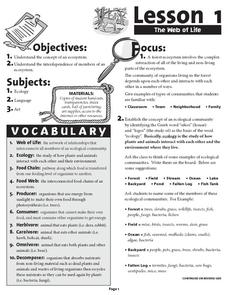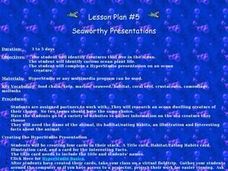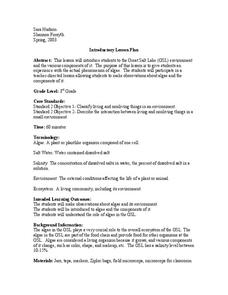Curated OER
Create a New Animal
Students understand what physical adaptations are and how they help an animal to survive. In this adaptations lesson, students research four animals and then make an original animal that has adaptations to make them survive.
Curated OER
Giants of the Animal Kingdom
Fourth graders examine the megafauna found in Australia. They create a food web using cut-outs and develop a timeline to show changes in the fauna over time. They draw their own megafauna scene for their classroom.
Curated OER
Explore the Food Web
Young scholars identify plants and animals in the journals of Lewis and Clark's expedition. They describe the various animal habits. Students interpret the behaviors of the animals discovered on the expedition. They design a food web...
Curated OER
Erase It! Endangered Animals
Students discover why many animals, insects, and birds are becoming extinct. They understand the importance of the food chain and how disturbing one area of it can cause havoc with wildlife. They discover how they can make a difference...
Alliance Theater
The Jungle Book Post-Show STEAM Lesson
An ecosystem is really just the flow of energy through many different living organisms. A study of Rudyard Kipling's The Jungle Book leads to an environmental science activity in which learners study how various factors can affect...
Curated OER
Introduction to Simulation Project
Students create a simulated self-sustaining ecosystem. In this biology lesson, students examine the different food chain and ecosystems in their model. They recommend some improvements and changes to an existing ecosystem.
Curated OER
What's In The Forest?
Students examine forest food chains and create a forest habitat in the classroom. They are introduced to the concept of interdependence in Nature. They define a simple forest food chain and develop inquiry process skills.
Curated OER
Plankton
Students research phytoplankton and zooplankton. In this food chain instructional activity, students read This is the Sea That Feeds Us and discuss plankton, food chains, and webs. Students define phytoplankton and compare them to land...
Curated OER
Cycles of Life in an Urban Habitat: Changes in Biodiversity
Second graders compare and contrast animate and inanimate objects. In this environmental science lesson, 2nd graders create simple food webs. They observe their environment and create a collage about it.
Curated OER
Sharks
Second graders identify and analyze the many types of sharks that can be found in the Great Barrier Reef in Australia. They also identify what the sharks eat for food, their habitats, and their constuction to the environment and the food...
Curated OER
Animals of Madagascar
Students are each assigned an animal from Madagascar. They research their animal and design a picture book about their animal. Students design a cover page, back page, bibliography page and the title page. Their book will contain...
Curated OER
The Web of Life
Students participate in a game in which they discover the balance of life in the ocean. They identify different organisms that rely on different types of food. They answer questions to complete the lesson.
Curated OER
Water's Edge Café
Students observe water birds feeding at a local wetland, record what they see, and construct an appropriate menu for a "Waterfowl Cafe." They also play a "flocking" game.
National Park Service
Reduce Our Carbon Footprint, Let’s Compost!
Roll up your sleeves and get a little dirty with this elementary and middle school compost lesson. All you need is a large plastic container, a couple old newspapers, some organic waste, and a few hundred worms and you're ready to start...
Curated OER
Earth Day Unit Plan: Pollution in the Anacostia River - Biology Teaching Thesis
Sixth graders are able to explain that there are pollutants in the Anacostia River, what these pollutants can cause, and how to prevent further pollution. They examine the impacts that the pollutants of the Anacostia River could have on...
Curated OER
Seaworthy Presentations
First graders research ocean animals and plants on the web. In this ocean habitat lesson, 1st graders prepare a multimedia presentation. Students will work on their presentations in pairs and every group should have its own animals or...
Aiken County Public Schools
Claymation in the Classroom
Young scholars design an appropriate and usable storyboard and then create a claymation video. They take digital photographs frame by frame, then assemble the stop-motion movie using video software.
Curated OER
Dibble Pond Ecosystem
Learners collect specimen and analyze it. In this biology lesson, students analyze and evaluate the diversity found in specific environment. They use the correct terminology as they do their write up for the experiment.
Curated OER
The Living Environment
Fourth graders make a chart of animals and plants that live in either the desert, the ocean, or the tundra. In this environment lesson plan, 4th graders work in groups to discover characteristics needed for these animals to live in that...
Curated OER
Water Pollution
Students explore the causes of water pollution. In this environmental lesson, students conduct experiments with natural filtration systems.
Curated OER
Great Salt Lake
Third graders are introduced to the Great Salt Lake (GSL) environment and the various components of it. They make observations about algae and its environment and discuss why it is considered a living organism and various components of...
Curated OER
Water Quality Survey: Monitoring the Sustainability of Pigeon Creek
Students research the History of Pigeon Creek (or any watershed in your area). In this environmental science lesson, students conduct field tests such as pH and nitrates. They collect data and compare what they collected with other groups.
Other popular searches
- Desert Animal Food Chain
- Science Animal Food Chain
- Animal Food Chain Diagrams
- Australian Animal Food Chain
- Free Animal Food Chain
- Animal Food Chain Pictures
- Artic Animal Food Chain
- Attic Animal Food Chain
- Egypt's Animal Food Chain
- Egypts Animal Food Chain
- Desert Animal Food Chain/fox
- Animal Food Chain Mobile























